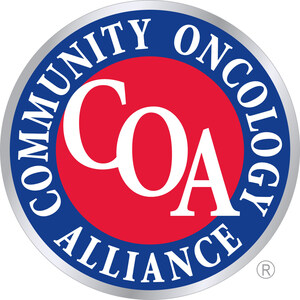Community Cancer Care Leaders Implore Congressional Leadership to Address Growing Crisis
Medicare payment reform legislation needed to avoid irreversible damage to system serving millions of American seniors
WASHINGTON, March 24, 2014 /PRNewswire/ -- Citing closures of community cancer clinics coast-to-coast, mergers with large hospitals, and increasing barriers to accessing care, the nation's leading community cancer care organizations are asking Congressional leaders to pass Medicare reform legislation to stabilize a critical program serving millions of U.S. seniors with cancer.
According to the Community Oncology Alliance (COA) and The US Oncology Network, current Medicare policy incentivizes care provided in more expensive hospital outpatient departments (HOPDs) and creates access barriers to cancer care — especially in rural areas — while also increasing costs for Medicare, seniors with cancer, and taxpayers. Further, sequester cuts to cancer drug reimbursement (which will have a practical impact of a 28% cut) – even while exempting portions of the Affordable Care Act from similar sequester cuts – have forced cancer centers to refer patients to the more expensive HOPDs increasing the cost of care for many cancer patients covered by Medicare.
"We are truly in crisis mode," said COA president Dr. Mark Thompson. "Today's Medicare policies fail to adequately reimburse cancer care provided in the community setting while incentivizing care provided in settings that are more expensive. Coupled with sequestration cuts that reduce reimbursement for costly cancer-fighting drugs, we're at a breaking point, and seniors with cancer will suffer most."
Data collected by the COA over the past six years clearly shows how cancer care has been impacted by Medicare policy: 288 treatment facilities have closed and 469 practices (typically having multiple treatment facilities) have been forced to merge or affiliate with hospitals. In 2005, 87 percent of chemotherapy was administered in community cancer clinics but by the end of 2011 that number declined to 67 percent.
"When community cancer clinics close, as is the current trend, seniors are forced to seek out other care alternatives," said Dr. Barry Brooks, chairman of the Pharmacy and Therapeutics Committee for The US Oncology Network. "That often means travelling farther distances to hospitals, which is inconvenient and actually means more expense to Medicare and to patients."
Cancer care delivered in HOPDs costs Medicare $6,500 more per beneficiary on an annualized basis versus care provided in physician-run community cancer clinics. Hospital-based care also costs seniors $650 more in out-of-pocket copayments compared to community-based care.
Higher expenses are also incurred as a result of the national drug shortage, which not only causes delays in cancer treatment, but also means switching to second-choice treatments, which are often costlier.
Community cancer care providers are encouraging Congress to create payment parity across sites of service, as recommended by the Medicare Payment Advisory Commission (MedPAC), and as is being adopted by some private insurers. Recently, Highmark Blue Cross Blue Shield announced it would establish payment parity for cancer care services regardless of the site of service, noting that a patient being treated for lung cancer could potentially save $1,000 to $3,500 per single treatment when treated in the less-expensive clinic setting.
Providers are also asking Congress to address the reimbursement mechanism for cancer drugs, which does not cover the full cost of acquiring, handing, storing and disposing of medications – and has been further impacted by sequestration. Additional cuts to drug reimbursements within the president's FY 2015 budget proposals would cause further damage.
A joint letter from the COA and The US Oncology Network to congressional leadership reads, in part, "Congress must act immediately to stabilize the community cancer care delivery system in any Medicare legislation before the shift of cancer care to the more expensive hospital setting becomes irreversible. Members of Congress on both sides of the aisle recognize this threat and have sponsored legislation to stop [Centers for Medicare & Medicaid Services] CMS' application of the sequester cut to cancer drugs (H.R. 1416), to fix the prompt pay problem that artificially lowers cancer drug payments (H.R. 800 and S. 806), and to adopt site-neutral payments for outpatient cancer care services (H.R. 2869). We implore the leadership to pass the SGR/payment reform legislation as well as move this cancer care package to stabilize the nation's cancer care delivery system."
The letter can be read in its entirety here: http://glacialblog.com/userfiles/76/COA_TUSON_CancerCare_Letter_3-20-14.pdf.
About Community Oncology Alliance (COA)
The Community Oncology Alliance (COA) is a non-profit organization dedicated solely to community cancer care, where almost 65% Americans with cancer are treated. Since its formation more than 10 years ago, COA has led community cancer clinics in navigating the increasingly challenging environment to provide efficiencies, patient advocacy and proactive solutions to the Congress and policy makers. COA members have testified before both chambers of Congress, authored cancer care demonstration projects, and been instrumental in the passage of oral cancer drug parity legislation, among many other initiatives. More information can be found at www.CommunityOncology.org.
COA is leading a multi-stakeholder group that is developing and implementing an Oncology Medical Home cancer care model and is advancing payment reform for cancer care. More information can be found at www.MedicalHomeOncology.org.
About COA Patient Advocacy Network (CPAN)
The COA Patient Advocacy Network (CPAN) was created in 2010 to advocate for access to local affordable care for all cancer patients. More information can be found at www.COAadvocacy.org.
SOURCE Community Oncology Alliance
WANT YOUR COMPANY'S NEWS FEATURED ON PRNEWSWIRE.COM?
Newsrooms &
Influencers
Digital Media
Outlets
Journalists
Opted In





Share this article